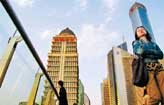Economy
Vendors being pushed out of retail park
Updated: 2011-07-25 10:52
By Tuo Yannan (China Daily)
BEIJING - Half of the electronics shops in Beijing's Zhongguancun shopping area will be shut down by the end of the year as part of a government reform of the high-tech industry, according to the Haidian district government website.
The move is a blow to many of the capital's personal computer component vendors. Zhongguancun, the country's biggest high-tech park, is known as China's Silicon Valley. As the earliest electronic trading zone, established in the 1990s, Zhongguancun is not only home to Chinese high-tech companies such as Lenovo Group, Baidu Inc and Sina.com, but also to well-known international IT companies such as Google Inc and Microsoft Corp.
According to the website, small vendors selling electronic parts and services are more likely to be moved on. The number of large flagship stores set up by big companies is expected to increase.
The area is regarded as a symbol of China's technological development. When US companies such as Hewlett-Packard Corp and Apple Inc had yet to enter the Chinese market, future chief executive officers of Chinese IT giants were busy helping their customers assemble generic, no-brand computers in Zhongguancun.
In a sense it was where IT dreams started. Feng Jun, president of Aigo Digital Technology Co Ltd, one of China's biggest digital equipment makers, started out selling PC parts in Zhongguancun after he graduated from university.
Another Chinese IT giant, Liu Qiangdong, the president and executive officer of 360buy.com, currently one of the most prestigious online business-to-customer shopping portals in China, was one of the first vendors in Zhongguancun.
Although they owe their success to the place, Liu said in an Internet development meeting last month that "a reduction in vendor space by 50 percent is the best method to promote vendor sustainability".
According to figures from Top Electronics City, the largest electronic shopping mall in Zhongguancun by sales revenue, its revenue reached 9.22 billion yuan ($1.42 billion) in 2010 from 6.12 billion yuan in 2008.
"We have 2,000 vendors in our shopping mall and more than half of them are PC component vendors," said a manager from Top Electronics City who did want to be identified. "Vendors occupy two out of five stories in our mall."
The mall opened in 2003 and vendor business reached its peak in 2004. However, when the laptop market started to heat up, the more portable products had a big effect on vendors, which primarily sell and assemble desktop computers.
"I don't think small vendors are low-end or low-tech businesses. Some military employees come here to assemble custom-made high-performance desktops, which can't be found in regular stores," said the manager.
Last year, seven IT shopping centers in the Zhongguancun area produced a total of 25.34 billion yuan in sales revenue, about half of it contributed by vendors.
China Computer Association's General-Secretary Zhong Xihe said it is usual for people to favor smaller and more portable computer products such as laptops and tablet PCs. As a result, desktops have become less popular.
Zhong Xin, a vendor at Top Electronics City, said he has been at the mall for five years. "Most of my customers are university students but, in recent years, they'd rather shop for PC parts online than go to Zhongguancun," he said. Zhong was forced to open an online shop last year on Taobao.com, a web-based store, to attract more customers.
Chinese IT giant Lenovo Group Ltd, the largest PC maker in China by market share, has made preparations for the changes already. Chen Xudong, vice-president and general manager of Lenovo, told China Daily that the company is planning to absorb some vendors into Lenovo's sales channel. Once pre-assembled desktops become mainstream in China, self-assembly will become a niche market, Chen said. "I believe many people agree with Lenovo's opinion and once the merger starts, the changes in the PC market will accelerate."
Wang Xing contributed to this story
China Daily
(China Daily 07/25/2011 page17)

Specials

Turning up the heat
Traditional Chinese medicine using moxa, or mugwort herb, is once again becoming fashionable

Ciao, Yao
Yao Ming announced his retirement from basketball, staging an emotional end to a glorious career.

Financial sector short of talent
Lack of skilled professionals in Shanghai inhibiting the city's development as a financial hub